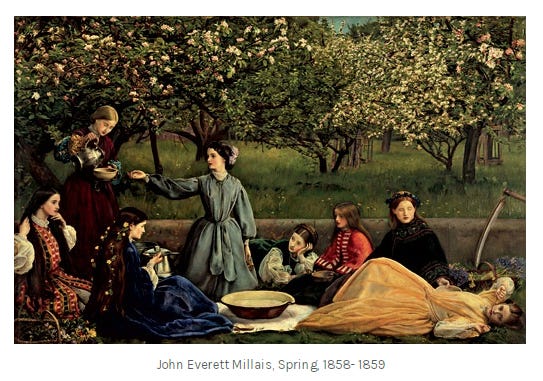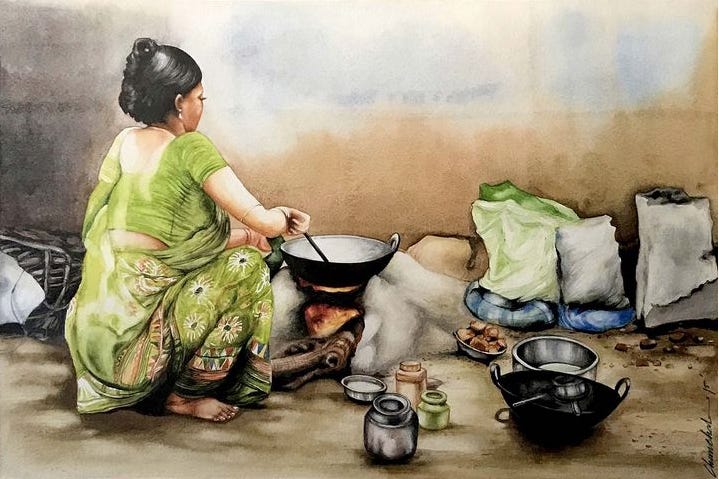Apologies from my tongue, and never yours
Busy lapping from flowing cup and stabbing with your fork
I know you're a smart man (I know you're a smart man), and weaponise
The false incompetence, it's dominance under a guise
If we had a daughter, I'd watch and could not save her
The emotional torture, from the head of your high table
She'd do what you taught her, she'd meet the same cruel fate
So now I've gotta run, so I can undo this mistake
At least I've gotta try
The capillaries in my eyes are bursting
If our love died, would that be the worst thing?
For somebody I thought was my saviour
You sure make me do a whole lot of labour
-Excerpt from Labour (song by Paris Paloma)
The song I referenced puts a fine point on a cultural wave of resentment towards men. The video and the theme of the song itself — escaping a man who sees his woman as a “nurse then a servant /Just an appendage, live to attend him /So that he never lifts a finger/ 24∕7, baby machine” is utilized as a feminist soundtrack to many TikTok videos. Its Handmaid’s Tale vibe seems completely intentional, and like the Handmaid’s Tale cable TV series, the song drops the F-bomb and portrays a woman as a pretty, long-suffering slave. The woman-as-modern-handmaid trope is well on its way to becoming a huge astral pyramid. Like any growing astral pyramid, the Handmaid Pyramid has already been monetized.
The current system cannot function without a bunch of perpetually anxiety-ridden, confused humans to keep it going. Anxiety is big business and relaxation isn’t what it used to be. Nowadays, relaxation is synonymous with huge expenditures of money. It is a lifestyle to which we are supposed to aspire: meditation retreats, fancy meals, tropical vacations. The ideal human of this era can somehow afford life of constant leisure after having retired at age 38. We are all supposed to want what the hedonist tech bro has. Nevertheless, people who can retire at age 38 are uniformly hated because almost nobody has that kind of wealth at 88, let alone 38.
A love/hate relationship with work
We humans both idealize and resent work, whether it is the paid work of making a living or the unseen work of keeping a home. In my own case, I was so hell bent on liking what I did for a living that I forwent health insurance, vacations that involve any form of travel, and having children in order not to be enslaved. For me, enslavement meant working any job where I wasn’t in nearly complete control, and that’s why I chose my current situation of a 20 year old car and no health insurance.
Whose work is it anyways?
As we see in the song Labour, rancor between the sexes often has largely to do with the division of labor. Both sides idealize their own contributions via work and resent having to do that work. Since the Industrial Revolution, large areas of manual work have gotten technically easier or have become automated. Work of any kind has diminished to a trickle for certain well-to-do. For everyone else, we ended up soaking in a labor deluge and practically killing ourselves to keep our heads above water. A wise kid (not me) once said the invention of the washing machine did not mean less laundry. We just got more clothes and washed them more frequently. Elite Victorian bankers and kings of industry enjoyed obscene wealth without lifting a finger, stepping deftly into slots formerly occupied by monarchs. Proper Victorian ladies delegated their own woman’s work of tidying, washing, and cooking to maids, laundresses, and cooks. Most Victorian women of any status did not nurse their own babies, delegating that most sacred and intimate of duties to low paid help or slaves. The current lifestyles of the rich and famous similarly outsource any and all dirty work to peasants. This is perfectly in sync with Old Victoria.
For all her troubles, such as not being able to vote or inherit property, the Victorian lady had it much better than her modern, elite counterpart. She may have felt trapped, but she was never expected to do everything a man does while remaining a perpetually young, feminine, beautiful woman. Women, including this woman, are exhausted from trying to be all things to all people. Nurturer at home, ball-buster at work, warrior on the battlefield, mother, divine whore. Like men, women are generally hard working. Like men, modernity has taken advantage of our docility and tolerance. We are all frogs in water that is growing uncomfortably warm.
Not that men are doing any better, but women are between a rock and a hard place at the moment. We have boxed ourselves into our own corner by taking on too much freedom. In Appetites, a memoir of severe anorexia by the late Caroline Knapp, the author describes becoming anorexic in college, when her anxieties crystallized as an eating disorder.
“Starving, in its inimitably perverse way, gave me a way to address the anxiety I felt as a young, scared, ill-defined woman who was poised to enter the world and assume a new array of rights and privileges; it gave me a tiny, specific, manageable focus (popcorn kernels) instead of a a monumental, vague, overwhelming one (work, love)." -Caroline Knapp, Appetites: Why Women Want
Women tend to externalize blame in order to avoid their own culpability. In Knapp’s case, a fixation with self-abuse via starving supplanted the hefty task of narrowing down exactly what she wanted and mercilessly eliminating the rest. Anorexia became her arena for achievement; it also became the externalization of her indecision.
In Paris Paloma’s song, she describes a common scenario where a woman externalizes her own feelings of entrapment to be entirely the fault of the man, who surely tricked her into giving away her etheric labour via methods tantamount to rape.
What causes etheric starvation
The reason I enjoy lake shores, forests, prairies, gardens, and wild or semi-wild places so much is because they offer a glimpse of ecosystems where forces are balanced and in harmony. In my novel River’s Heart, the protagonist is sent out to sweep leaves in the yard as punishment. During her sojourn, she bitterly muses about having to clean up “nature’s mess”. Nature does not make any mess she cannot fix. When she visits destruction upon herself via a flood or a caldera exploding, she eventually fixes it up and makes it new again. The human project (which often looks like one of her mistakes) will peter out. Thanks to the 75% percent of humans who took MRNA vaccines, this may happen much sooner than originally expected. Whether we do it quickly or slowly, it is the lot of all civilizations to be compressed into a thin layer of carbon. This layer is not likely to be discovered or remembered by any intelligent visitors. If and when they arrive, we will probably be long gone. Nature will turn all heroes into zeroes whether they like it or not. So when I go on my long, solitary walks, I get to see the glacial process of the ecosystem correcting and balancing itself the way it did before humans and the way it will after humans are gone. 99.9 percent of species on this planet have gone extinct and I am confident humans will not be nearly as resilient as sharks or jellyfish. As a believer in the soul, I wonder if my soul will incarnate once humanity is a memory or if I will stay in the vapors and/or wander off to another universe. It’s not information I am equipped to know.
The reason working ecosystems are restorative is because they are places where the etheric or energy plane is balanced, or mostly balanced. Plants, air molecules, dirt, bugs, birds, and other animals have no other choice but to own the means of production, and the energy created of work where workers own the means of production is always more plentiful and nourishing than in areas where the means are far removed from the laborer. The song Labour is about the man stealing the woman’s energy via her work and dominion over her children, much like the cuckoo steals into a robin’s nest and kills the baby robins in order to hijack the mother and father robin’s half-digested worms.
The means of production
Every morning, I sweep the floor with a broom made of metal and plastic. The dustpan is entirely made of plastic and has a matching mini-broom that nests inside it. While I sweep, I boil water from tea on my stove. The water comes from Lake Michigan. It comes through pipes I did not lay. I filter it in a charcoal filter device that I bought online. As for the tea, I did not grow it. It is from China. I drink my tea and then go to another room in my natural gas-heated house. I burn incense imported from India and do my daily banishing ritual. I then meditate and record my observations in a notebook made of trees I did not chop with a pen made of foreign plastic.
Before I turn on a single machine, I have used at least a dozen items I had no hand in creating. Compare the pioneers and those before them: they lived in what James Howard Kunstler describes in his novels as “a world made by hand”. Pioneer lives were very hard, and they starved to death more frequently than us when they were not dying of sepsis. Nevertheless, they did not have the troubles we have with etheric starvation. They did not pathologically fear death as we do. Nobody before 1940 was turned into a medical zombie of perpetual agony, with teams of do-gooders rushing to hook him up to machines and brutal infusions of drugs. There were no armies of semi-alive drones on IV drips rotting in hospital beds, crying to be taken to homes that were sold off by the adult children who abandoned them.
Prosthetics for living such as the lightbulb, the food processing plant, cars, computers, and lately AI both giveth and taketh away. We humans increased our workload with machines and etherically starved in the process.
Etheric labor shortages
As I have said, all healing comes from the etheric and the further away we are from the means of production, the higher the likelihood we will have etheric starvation. Etheric body starvation manifests itself in illness and/or compulsive and addictive behavior. Etheric starvation is endemic to our current era; it is baked into the pie. Nobody can escape. Many will try by going back to the land or traveling to places of etheric richness like Thoreau tried to do with Walden. The whopping majority will attempt to remedy etheric starvation via one or more addictions.
Women, being male on the etheric, are the primary drivers of etheric wealth of the sort that alleviates etheric starvation. As much as women are the main creators of etheric wealth, men can do it too. Cleaning and tidying are etheric male activities regardless of the sex of the person doing them. Neatening and caring for a space infuses it with positive, vital etheric energy. When someone cooks, food is alchemically transformed into sustenance, and this is why cooked food is more nourishing than raw. The more love and skill that goes into the cooked dish, the more etheric energy it will provide. Only etheric males can conceive a child, and since children are etheric males regardless of sex until puberty, an etheric male (physical female) creating other etheric males (children) is about as etherically male as it gets.
Industrialization gave rise to upper class women being trapped inside the manor or plantation. From her gilded cage, the great lady was neutered of her etheric skills, as cooking and cleaning require practice in order to get any better. Her etheric labor was done by a bunch of indentured servants and slaves. Common women were abused for their competence and their etheric labor stolen. Almost nothing has changed since the old days. Once the plantation gave way to the factory, women were hoodwinked into amassing conveniences that further took away their motivation to practice etheric wealth-formation in any way save popping out kids. Vacuuming replaced sweeping the floor and microwaving a burrito replaced patting out tortillas by hand and chopping home grown tomatoes for salsa. Much time was saved but all that precious etheric energy said “Adios, amigo”.
The most devastating blow to the collective etheric plane was dealt when women were forced to work outside the home. Just because work (i.e. housework or chores) are not paid does not mean they are not worth money. I will argue in my upcoming book Sacred Homemaking that the value of skilled housework is beyond rubies. Even upper middle class households in my area of Chicagoland feature breadwinning wives. It’s just too expensive these days to have upper middle class perks like electric SUVs and trips to Europe every year without both spouses hauling ass in salary class positions.
Covid shutdowns trained an entire generation of workers that commuting to an office was unnecessary and sadistic. Home is where we go to heal our etheric bodies and when home is taken from us by work, it is a fate worse than death. Women rule the home just as they have always done; no amount of forcing women into men’s roles will take that away. When a woman is forced to commute and spend the majority of her time far away from home just like a man, she feels etherically castrated. Some castrati are simping, willing eunuchs who lick their oppressor’s boots. Others, like me, are outraged and planning a coup.
Freedom for women, a.k.a. feminism, forgot to include a space for women who want to assume traditional roles and stay home. As long as men are expected to be women are expected to be men, we will all suffer more etheric shortages, addictions, illnesses, and existential fatigue. Convenience came at a heavy price.



